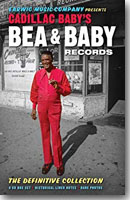
Narvel Eatmon (aka Cadillac Baby) was a jack-of-all-trades, to be
sure. The Mississippi-native and Chicago resident worked as a promoter,
night club owner and businessman before launching his own record label,
Bea & Baby Records, in 1959. The label struggled, competing with the
other formidable blues and R&B labels in Chicago at the time --- Chess,
Vee-Jay, Delmark, etc --- and basically went under in the early
’60s.Eatmon continued to record local artists through the ’60s, and the
label enjoyed a bit of a resurgence in the early ’70s after Jim O’Neal
interviewed him for Living Blues magazine.
Though Bea & Baby didn’t really enjoy much success beyond the region
during its heyday, an impressive number of Chicago blues artists, many
now considered to be legendary in stature, crossed paths with Eatmon
during those years and many recorded sides for the label. Bea & Baby
only released one album, a collection of old 45s gussied up into a
“live” recording inspired from the positive reception of the Living
Blues interview, but many of the 45s originally released became much
sought-after collector’s items.
In 2006 Earwig Music Company owner Michael Frank purchased the Bea &
Baby catalog from Eatmon’s widow (Eatmon passed away in 1991). Since
then, Frank has worked tirelessly to put together Cadillac Baby’s Bea
& Baby Records: The Definitive Collection (Earwig Music Company), a
massive four-CD, 101-track compilation of nearly all of the label’s
output from 1959 through two previously unreleased sides from 1990 by a
rapper that represented Eatmon’s last musical project (he co-produced
and financed the session).
A host of Chicago blues luminaries recorded for Bea & Baby, including
piano men Sunnyland Slim, Eddie Boyd, and Detroit Junior, slide guitar
legends Homesick James, Earl Hooker, and Hound Dog Taylor (his first
recordings), James Cotton, and journeymen Mack Simmons, Lee Jackson,
Arelean Brown, Willie Williams, Andrew “Blueblood” McMahon (Howlin’
Wolf’s longtime bass player), L.C. McKinley, and Bobby Saxton. The
latter recorded Bea & Baby’s most successful side, “Trying To Make A
Living” (with guitar from Hooker). Eatmon also recorded sides for Sleepy
John Estes and Hammie Nixon (which were unreleased until now), and
numerous gospel, doo wop, comedy and soul sides.
Listeners will also find out a lot about Cadillac Baby himself via
several clips from the 1971 interview with O’Neal and a 1983 interview
with Steve Cushing for his “Blues Before Sunrise” radio program. Also
included is a 128-page booklet with O’Neal’s 1971 Living Blues
interview with Eatmon, rarely seen pictures, archival documents, liner
notes from O’Neal profiling the blues artists and from Robert Marovich
on the gospel artists, track listing and notes from Bill Dahl, and
remembrances from Frank.
A glance at the track listing in the booklet shows supporting
musicians nearly as well-known and regarded (some more so) than the
front men, notably Hooker, Robert Lockwood, Jr., Jimmie Robinson, Red
Holloway, Eddie King, Buddy Scott, Lacy Gibson, Jump Jackson, Johnnie
Jones, Willie Hudson, Hubert Sumlin, Eddie Taylor, Carey Bell, Fred
Below, and many others. There’s no doubt that there was some wonderful
music from the label made in a short time. Some of the tracks can be a
bit rough and ragged, and occasionally out of tune, but there’s a whole
lot of heart and soul in this music.It’s obvious that Eatmon had a great
love for the music --- all of it --- and a great ear as well, because
there are some wonderful performances here.
The whole set is worth at least one listen, but blues fans will be
impressed with many of the rarely-heard sides here. The Sunnyland Slim
sides are particularly noteworthy and the Homesick James sides rank with
some of his best. Eddie Boyd is featured in a variety of settings that
reflect well on his versatility as an artist, as is Detroit Junior, and
the Hound Dog Taylor sides show that he was into “Genuine Houserockin’
Music” well before he helped Bruce Iglauer kick off Alligator Records.
No fan of Chicago blues should be without Cadillac Baby’s Bea &
Baby Records: The Definitive Collection. This set is indispensable.
Kudos to Michael Frank for working so hard to make it a reality.
--- Graham Clarke